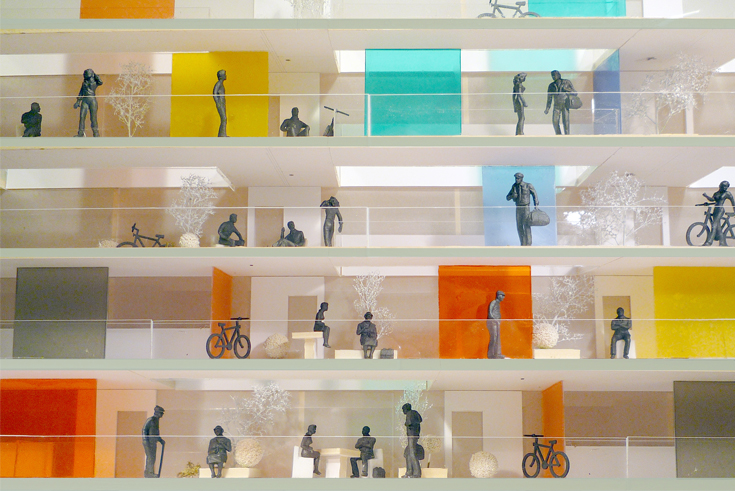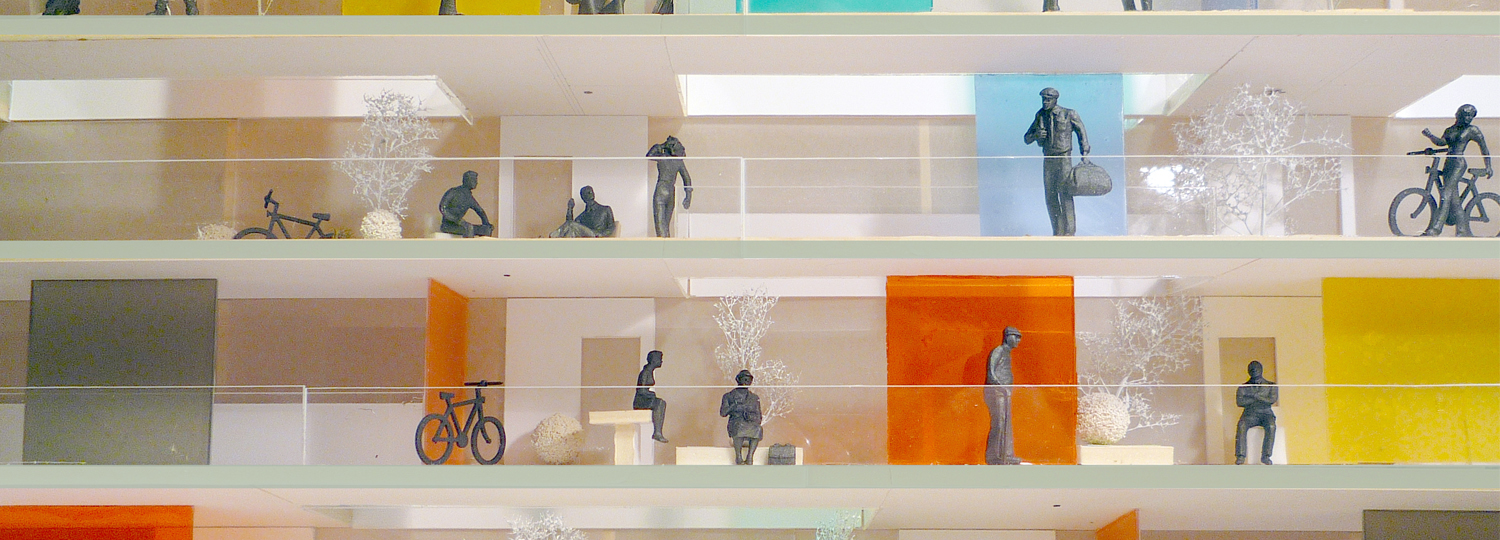Out of the niche Sharing concepts for the housing industry

Innovative Wohnformen und Mobilitätsdienstleistungen werden im Forschungsprojekt WohnMobil analysiert (Foto: WUP_wimmerundpartner)
Alternative forms of living are no longer as alternative as they were at their inception, and have paved the way for a new definition of living. For many it is a question of quality of life: self-determined, affordable and communal living, combined with the desire to conserve the environment and resources. In this context, the sharing of goods and spaces plays a decisive role. In recent years, many new residential initiatives – module, multi-generational and cooperative concepts – have emerged, particularly in conurbations, offering housing-related services, such as car-sharing, removal and repair services and shared-use areas. These services improve housing satisfaction through joint activities and are resource-saving and environmentally friendly.
In the wake of current challenges with regard to climate change, the necessary urban densification and the resulting shortage of space, the question arises as to what extent this model could be transferred to the housing industry. Under the direction of the ISOE – Institute for Social-Ecological Research in Frankfurt, the Institute for Ecological Economy Research (IÖW) and the Institute of Applied Ecology (Öko-Institut), a research team has now been investigating the sustainability potential and economic viability of various organisational and business models for residential services over a period of three years. Can the ecological and economic advantages of sharing services from once alternative housing concepts now also be transferred to living in general? And if so, what does this mean for living, building and mobility? The research results have given rise to strategy recommendations for housing enterprises and housing initiatives for the establishment of permanent housing-related services.
Research in real laboratories
The research is based on a three-year monitoring of two housing initiatives and a housing company. In three real laboratories it was examined how community services can be strengthened in self-organised forms of housing and under which aspects these services can be implemented in the housing industry. The research project defines housing-related services as "offers [...] that are accessible to residents in their residence, residential building or residential environment. They range from room-maintenance and shopping services to concierge services, activity offers and device rental." Real laboratories is the name given to the cooperation between science and practice in which the focus is on learning from one another and testing new things.
The project partners were a municipal housing company with around 2,100 apartments, of which one third are publicly subsidised. A building and housing cooperative that offers intergenerational and socially-mixed forms of housing and which has also built ecologically and energy-efficient buildings was chosen as an additional project partner. As the third project partner, a residential owners' association was chosen whose living spaces were planned on a resident basis, with the layout of the apartments varying depending on their lifestyle and life phase.
Car sharing, multifunctional rooms and communal gardens
In order to obtain the largest and clearest possible range of findings, the real laboratories opted for models dealing with neighbourly mobility services, the joint use of a multifunctional room and the use of a communal garden for older residents. Neighbourly mobility services include car-sharing, bicycle, e-bike and load-bike rental, as well as the shared use of public transport tickets and shared bicycle repair shops. The research project focused on car sharing. As private cars are usually used for only one hour per day, it is a good idea to share vehicles. The use of fewer cars by several households leads to a reduction in parking space requirements. In addition, construction costs are lowered and traffic areas are available for other uses, which ultimately has a positive effect on the quality of outdoor living. Jointly-used rooms represent places of encounter and communication. A multifunctional room is designed for different uses and can be equipped with devices if necessary. By providing such space, the need for space in own homes is reduced. In addition, there is no need to purchase certain devices and materials. Communal gardens are a popular form of residential facility. They are located in the immediate vicinity of the residential building and are jointly designed and maintained by the residents. Such places are ideal for relaxation and can also strengthen the sense of community. If the garden is also planted accordingly, it can also have a positive effect on the microclimate and biodiversity.
Strengthening the community through participatory offers
In order to find out to what extent such offers are sustainable, an evaluation system has been developed that comprises five criteria: ecology, social, economic, process and actual use of the service. Based on the findings, ten core messages were again formulated, which as strategy recommendations are directed at housing initiatives and companies, as well as local and state politicians.
The results from the real laboratories of the WohnMobil project have shown that housing-related services can promote sustainable housing. Residents rate their overall housing satisfaction higher if they can implement ecologically-sensible and community-building measures at their place of residence. Such offers created in the course of participative planning prove particularly attractive in the residential environment, because the design is oriented to the needs of the users. Projects that were overseen by an external expert and which included professional moderation were particularly successful.
The results from WohnMobil show that housing companies and housing initiatives would be well advised to integrate sustainable housing services into their organisational and business models in the future, since they create considerable added value for the residents. Participatory design increases their identification with the projects, strengthens responsibility and promotes interaction within the community. In many respects, therefore, residential services contribute towards creating a residential area that is worth living in and which is oriented towards sustainability.


